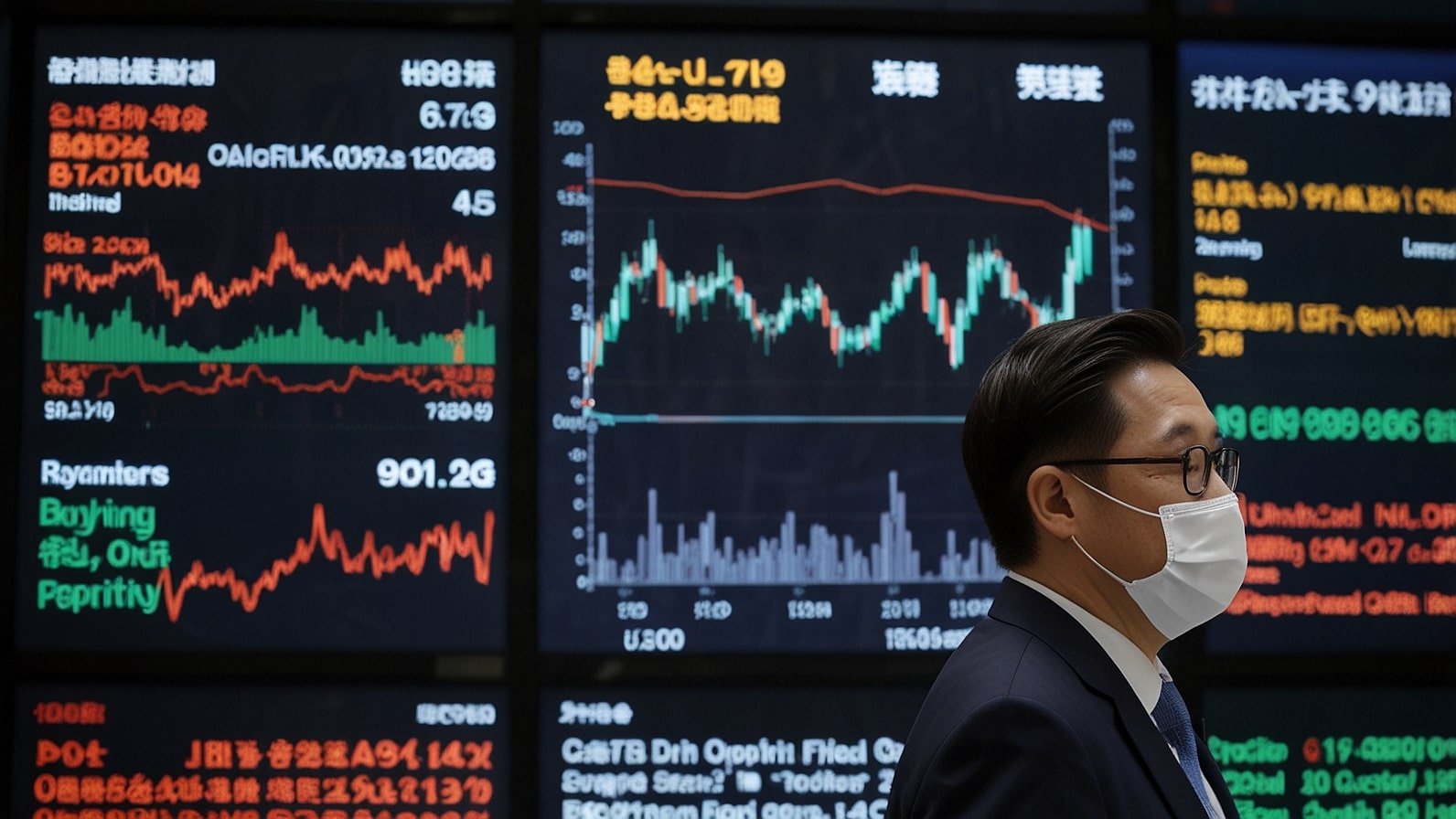
Chinese Steel Stocks Crash 7% as EU’s Carbon Tax Ignites Global Trade Firestorm: Baosteel Leads $15B Wipeout
The Carbon Border Adjustment Mechanism (CBAM) by the European Union, in a seismic move to international trade, fully took effect on the 22 nd of September 2025, when it levied heavy tariffs on carbon-intensive imports, such as steel and aluminium imports, which are high emitters.
Chinese steel giants Baosteel and China Steel fell more than 7 per cent in Shanghai at the open, wiping out close to 15 billion dollars of aggregate market value and causing a ripple effect on the global commodities markets.
The policy, which aims to level the playing field for green EU industries, has sparked fears of retaliatory actions by Beijing, which would disrupt delicate global supply lines amid current U.S.-China tensions.
The European markets started off on a low note, as the Stoxx 600 index rose 0.2 per cent on the strength of the energy industry, though steel stocks such as ArcelorMittal fell 4 per cent.
Futures on Wall Street indicated a sluggish start, with the Dow down 0.1 per cent, as investors considered the consequences for U.S. manufacturers that would depend on cheap imports from Asia. Oil prices were kept at a stable price of 73 per barrel, with the iron ore futures in Singapore declining by 2 per cent to 105 a tonne, indicating the short-term strain on raw materials.
The CBAM implementation is a crucial enforcement stage following years of preparation, and this implies that importers will have to provide information on embedded emissions and pay the fees, which are equal to the price of carbon in the EU- currently approximately EUR85 per tonne of CO2.
To China, which is the largest steel producer in the world with an output of more than 1 billion tonnes per year, this is a billion worth of added cost to a sector already strained by overcapacity and declining building demand at home.
Policy Ignition: EU’s Green Gamble Against Carbon Leakage
The much-anticipated CBAM implementation by the European Commission will fight the dirty production relocated to the countries with lax regulations, which weakened the Green Deal of the bloc worth EUR1 trillion.
Moving off of reporting to full payments, the mechanism currently includes steel, cement, fertilisers and electricity, with aluminium and hydrogen coming next year. Authorities estimate that it would produce EUR14 billion in the year 2030, which will finance renewable changes but place pressure on polluters to decarbonise.
Opponents in Brussels and elsewhere have been warning of inflationary threats, and reckon an inflationary increase in construction prices of between 1 and 2 per cent in Europe. It is protectionism in the guise of environmentalism, one of the representatives of the China Iron and Steel Association declared, threatening to resort to court litigation in the World Trade Organisation.
Beijing has already issued preliminary warnings, such as increased subsidies for green steel technology and potential duties on EU luxury products, including wine and automobiles. Timing enhances weaknesses. As the Chinese property business is batting about, the Evergrande aftermath is still felt, and steel products exports boomed 15 per cent year-on-year, oversaturating markets.
China’s exports to the EU have also reached 25 million tonnes in imports last year, and now they are subject to up to EUR200 per tonne in high-carbon variants. This has seen a scramble to file compliance filings, yet small exporters are pushed out of the market.
Chinese Steel Sector in Freefall: Baosteel and Rivals Brace for Pain
The Composite Index of Shanghai fell 0.5 per cent in its early days, but steel stocks led the way. The crown jewel that has a market capital of 120 billion, Baosteel, plunged 7.5 per cent to 6.20 yuan, the largest one-day fall since the 2022 property crisis.
Competitor China Steel dropped by 7.2 per cent to 4.80 yuan, and Ansteel dropped by 6.8 per cent. The giants in the industry, which take up 40 per cent of the world production, are now faced with margins that have been reduced by 2030 per cent under the new regime.
The charge is not simply a tariff; it is an existential threat that will need a shift to low-carbon production within a couple of hours, said an analyst at a Hong Kong-based brokerage. Baosteel, a company that has committed to achieving net-zero by 2050, has already spent $5 billion in hydrogen-based steel production, yet scaling is years away.
In the short term, companies are looking at workarounds, such as redirecting their shipments to Vietnam or Turkey, other countries with smaller CBAM exposure, but the EU customs is broadening its auditing to eliminate such loopholes.
Other than shares, employment is a victim of the fallout. Steel mills in China are the employers of millions of people, and the plants will be put at risk of closing down in case exports slow down.
Lenders supported by the state are also said to be planning bailout packages, but the mood of the investors is not good because the levels of debt in the sector are already at 150 per cent of the GDP. Baosteel has a 10 per cent foreign ownership stake in its outstanding stock, which is being sold off by foreign investors due to pressure from ESG funds.
Ripple Effects Across Global Commodities and Markets
The CBAM shockwave spread to commodity exchanges. The FTSE 100 of London rose by 0.3 per cent on the strength of the banking sector, yet the mining giants Rio Tinto and BHP dropped 3 per cent each on the mounting concerns about the iron ore demand.
This is because in the U.S., Nasdaq futures went down 0.2 per cent as steel users such as Nucor and U.S. Steel fell 2.5 per cent in pre-market on import competition concerns. Asia Pacific markets were not in line with each other: Tokyo Nikkei gained 0.8 per cent on the electronics gains, whereas Sydney ASX 200 dropped 0.4 per cent, pulled by miners.
The Australian dollar was also beaten down 0.5 per cent against the greenback to $0.66 due to its dependence on China’s demand for iron ore. Bitcoin stood at $62,000, and traders were seeking safe havens beyond metals, as the cryptocurrency gained strength.
Expansive equities were a sign of policy uncertainty. VW and BMW, which were sensitive to the EU supply chains, slipped 1 per cent at Frankfurt, as they feared that their upstream cost would rise.
On the other hand, green investments were also boosted by renewable plays, such as Orsted, by 2.5 per cent. The euro gained 0.3 per cent to $1.1,2, which is an indication that the market supported the climate determination of the bloc.
The administration of U.S. President Trump closely followed, with indications of going hand in hand with CBAM by adding to the already high Section 232 tariffs on steel, which are already 25 per cent. The shift to Europe justifies our America First steel safeguards, one of White House aides observed, which could triple the transatlantic responsibilities of Chinese merchandise.
Corporate Counterplays: Incidental Innovation and Supply Chain Drifts
Chinese firms aren’t passive. Baovel (2016): Baosteel formed a two-billion-dollar collaboration with ThyssenKrupp of Germany in terms of electric arc furnace technology to reduce emissions by 50 per cent by 2028.
China Steel is also testing carbon capture at its Bayuquan facility with the aim of getting EU credits to pay off. However, they are long-term plans; you will find short-term relief in domestic stimulus with Beijing announcing a Y=500 billion issue of green bonds to finance cleantech.
The policy generates reshoring globally. The U.S. steel production, which is 5 per cent higher this year, is supported by subsidies in the IRA and Nucor projects, and earnings are expected to continue rising by 10 per cent. Salzgitter, a producer of EU, intends to expand by EUR1 billion in low-carbon plants, targeting to gain market share.
But the pain is being experienced by the consumers: Boeing and Airbus threaten to raise the price of the aircraft by 3-5 per cent, and the building companies, such as Vinci, have postponed the construction.
Experts in trade believe that a WTO case would last until 2026; however, the EU has a precedent that supports its position under the GATT exception for environmental concerns. In the case of multinationals, it is diversification that matters the most- Apple and Tesla are screening suppliers on CBAM, potentially moving 20 per cent of sourcing to Mexico or India (irony of it is not the first on the agenda).
Highlight the Other Market Movers in the Steel Storm
As steel prevailed, various industries were in focus on September 22. In technology, Nvidia was soaring 3 per cent in post-hours on AI chip demand outlook, which propelled its valuation over 3 trillion. Tesla fell by 1.5 per cent even after record Q3 deliveries, following Cybertruck recall rumours.
Energy brightened: ExxonMobil rose 2 per cent following a $10 billion acquisition in the Permian Basin that enhanced American shale supremacy. Chevron was second with 1.8 per cent on LNG export deals with Europe. Renewables overtook Energy by 4 per cent due to solar panel subsidies in California.
Mixed: JPMorgan has picked up 0.5 per cent in the pre-earnings trade, and Goldman Sachs has dropped 1 per cent on trading desk sluggishness. Biotech biased, with Moderna spiking 5 per cent on the success of its mRNA flu clinical trials, looking at holiday approvals.
Retail picked up: Walmart is up 2.2 per cent on e-commerce wins, and Amazon is at zero amid antitrust investigations. In the case of luxury, LVMH fell by 1.5 per cent as a result of fears of a slowdown in China.
Boeing and Delta Air Lines surged by +0.8 and 3 per cent, respectively, in the aviation sector, with Boeing levelling after FAA approval of 737 MAX upgrades, and Delta Air Lines soaring on fuel hedges. Coinbase, the closest competitor to Crypto, surged 4 per cent with the introduction of Ethereum ETFs and attracted $500 million in flows on the first day.
On the Horizon: Green Ambition vs. Economic Reality
As the meetings progress, the attention is shifted to ECB rate signals -markets price a 50-basis-point cut in October- and U.S. jobs data on Friday. In the case of steel, the CBAM age requires agility: either Chinese giants are forced to innovate or consolidate, whereas the world players can reap benefits from sustainable products.
This conflict underscores the duality of the green transition, i.e. environmental gains at economic expense. Shareholders are seeking bargains in fallen shares, but volatility remains. September 22 cuts a fresh chapter in the history of trade wars, in which carbon can be counted just like cash flow, and industries are being transformed over decades.



 Bitcoin
Bitcoin  Ethereum
Ethereum  Tether
Tether  XRP
XRP  USDC
USDC  Solana
Solana  TRON
TRON  Lido Staked Ether
Lido Staked Ether  Cardano
Cardano  Avalanche
Avalanche  Toncoin
Toncoin